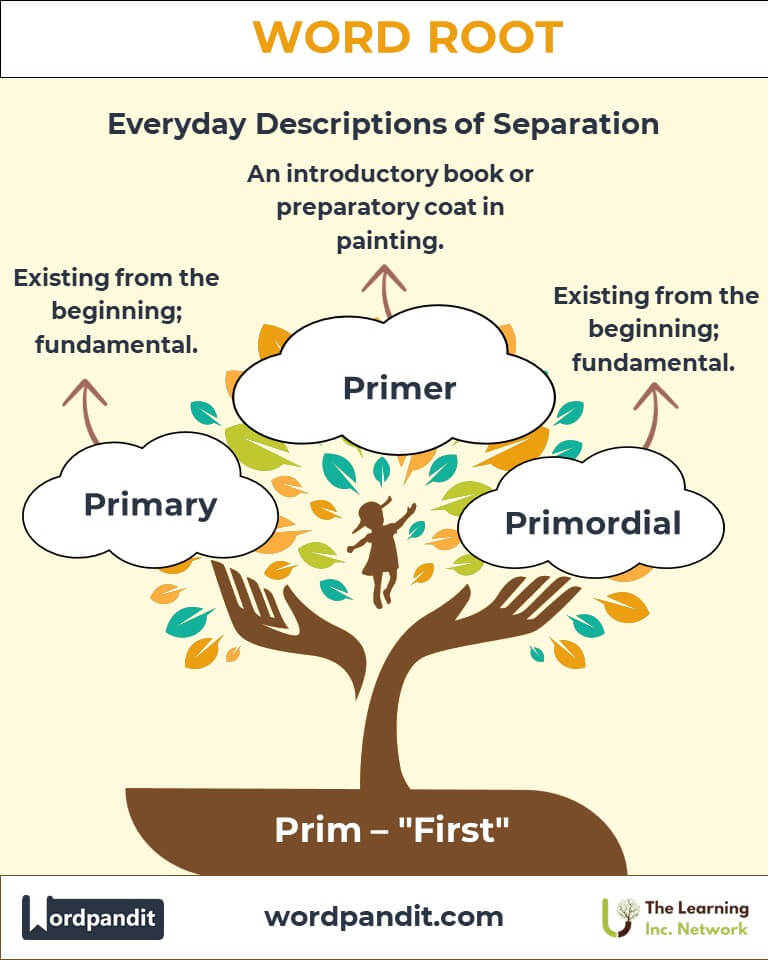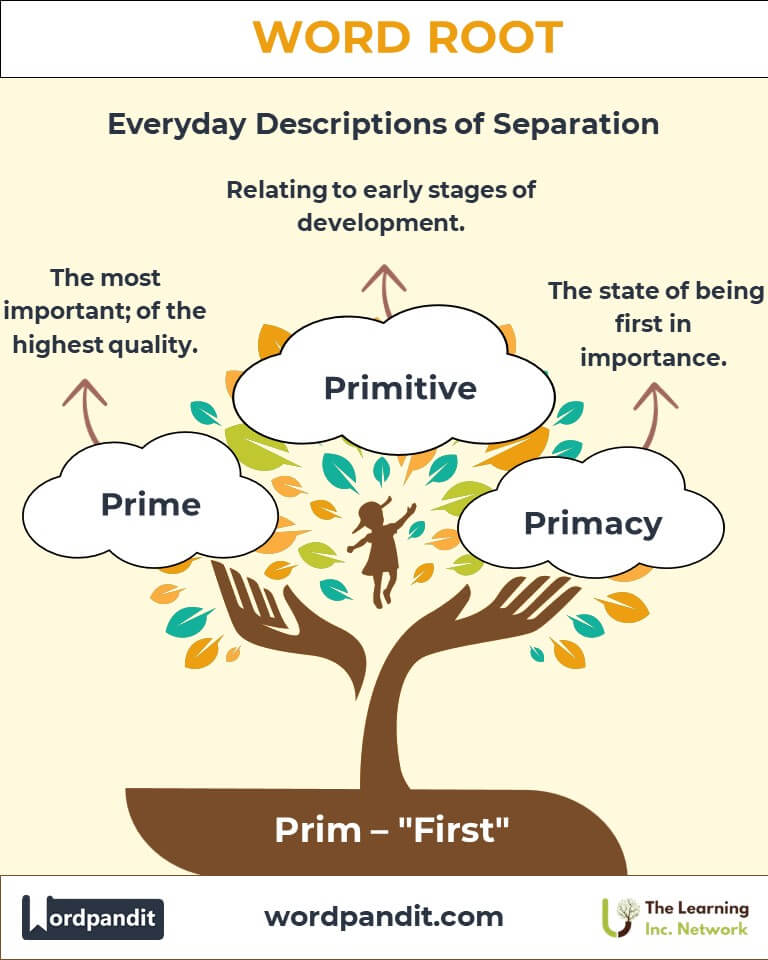Prim: The Foundation of Firsts in Language and Thought
Explore the significance of the root "prim," derived from Latin, meaning "first." From foundational concepts like "primary" to the early stages symbolized by "primitive," this root has established itself as a cornerstone of language, evolution, and hierarchy.

Table of Contents
- Introduction: The Essence of "Prim"
- Etymology and Historical Journey
- Mnemonic: Unlocking the Power of Prim
- Common Prim-Related Terms
- Prim Through Time
- Prim in Specialized Fields
- Illustrative Story: Prim in Action
- Cultural Significance of the Prim Root
- The Prim Family Tree
- FAQs about the Prim Word Root
- Test Your Knowledge: Prim Mastery Quiz
- Conclusion: The Living Legacy of Prim
1. Introduction: The Essence of "Prim"
Think of the first step you ever took or the first star that shone in the night sky—it all began with "prim." This root, pronounced "prim" (as in "primrose"), derives from Latin primus, meaning "first." Its influence spans concepts of order, importance, and origins. From "primary education" to "primitive tools," the root "prim" highlights beginnings, essentials, and early stages.

2. Etymology and Historical Journey
The root "prim" traces back to the Latin word primus (first). It was adopted into Middle English through Old French and found its way into a variety of terms reflecting precedence and origin. In ancient Rome, primus was a title of honor, used to denote the foremost or most important individual, such as the princeps (first citizen).
Over centuries, "prim" has maintained its association with initial stages, foundational elements, and hierarchical importance.
3. Mnemonic: Unlocking the Power of Prim
Picture a podium with "Prim" etched on the top step, symbolizing the first place in a race. Here’s a mnemonic:
“Prim always wins first place, setting the stage for what’s to come.”
4. Common Prim-Related Terms
- Primary: Of chief importance; first in sequence.
Example: "Primary colors are the foundation of all others." - Primitive: Relating to early stages of development.
Example: "The archaeologist studied primitive tools from ancient times." - Prime: The most important; of the highest quality.
Example: "This is a prime example of innovative thinking." - Primer: An introductory book or preparatory coat in painting.
Example: "She read a primer on astronomy to grasp the basics." - Primordial: Existing from the beginning; fundamental.
Example: "The primordial soup theory explains the origins of life."
5. Prim Through Time
- Primitive: Initially referring to the earliest stages of human and cultural development, "primitive" now also describes anything rudimentary or basic.
- Prime: Evolving from its Latin roots, "prime" became synonymous with excellence and importance, influencing fields like mathematics (prime numbers) and economics (prime interest rates).
6. Prim in Specialized Fields
- Biology: Primordial—Referring to initial cells or elements in evolutionary theory.
Example: "Primordial cells formed the building blocks of life." - Mathematics: Prime Number—A natural number divisible only by itself and 1.
Example: "Prime numbers play a critical role in cryptography." - Education: Primary Education—The first stage of formal schooling.
Example: "Primary schools focus on foundational skills like reading and arithmetic." - Linguistics: Primacy—The state of being first in importance.
Example: "The primacy of speech over writing was debated in linguistics."
7. Illustrative Story: Prim in Action
In a distant village, young Maria dreamt of creating the first community library. With the help of a teacher who provided her with a primer on organization, Maria began collecting books. Starting with primary readers for children, her library grew, becoming a prime example of how education can transform lives. Her efforts echoed the primordial need for knowledge and connection.
8. Cultural Significance of the Prim Root
The concept of "firsts" resonates deeply across cultures. From myths about the "primordial" creation of the universe to societal emphasis on being the "prime" candidate or leader, "prim" underscores humanity’s fascination with beginnings and importance.

9. The Prim Family Tree
- Proto- (Greek: "first"): Prototype—The first model of a product.
- Arch- (Greek: "chief, first"): Archangel—A chief angel.
- Fore- (Old English: "before"): Foremost—First in rank or importance.

FAQs About the "Prim" Word Root
Q: What does "Prim" mean?
A: "Prim" originates from Latin primus, meaning "first" or "foremost." It reflects concepts of order, importance, and beginnings, as seen in terms like "primary" (of chief importance) and "primitive" (relating to early stages).
Q: How is "Prim" used in education?
A: In education, "Prim" appears in terms like "primary education," which refers to the foundational stage of learning. This stage focuses on core skills such as reading and arithmetic, establishing a basis for further education.
Q: What is a prime number?
A: A prime number is a natural number greater than 1 that can only be divided by itself and 1 without leaving a remainder. Examples include 2, 3, and 5. Prime numbers are fundamental in mathematics, especially in fields like cryptography.
Q: What does "primordial" mean?
A: "Primordial" refers to something that existed from the beginning or is fundamental in nature. For example, the "primordial soup" theory explains the origins of life from early organic compounds in Earth's oceans.
Q: How does "Prim" appear in everyday language?
A: Common words like "prime" (the most important), "primitive" (early stages), and "primer" (an introductory guide) all reflect the root "Prim" and its emphasis on beginnings and importance.
Test Your Knowledge: "Prim" Word Root Quiz
1. What does the root "Prim" mean?
2. What is a prime number?
3. What does "primitive" describe?
4. What does "primordial" signify?
5. What is the purpose of a primer?
12. Conclusion: The Living Legacy of Prim
From ancient concepts of precedence to modern applications in education, science, and culture, the root "prim" reminds us of the importance of beginnings. Whether through "primary" education or "prime" opportunities, "prim" symbolizes the essential start to every journey.












